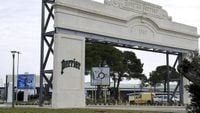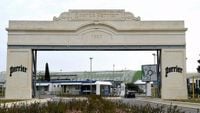A troubling scandal has emerged at the Perrier factory in Vergèze, Gard, following the discovery of pathogenic bacteria in its bottled water. This alarming situation raises significant questions about food safety and the reliability of one of the world’s most famous mineral water brands.
In March 2025, an internal quality control revealed the presence of enterobacteria in approximately 300,000 bottles of 75 centiliters produced at the Vergèze plant. This prompted an immediate halt to the distribution of these bottles, which were stored in warehouses to protect consumers. Furthermore, other batches, including hundreds of thousands of 50 centiliter bottles, were also blocked due to an excess of revivable germs, which could indicate potential bacterial contamination.
This is not the first time Perrier has faced such issues. In April 2024, the company had to destroy three million bottles due to similar bacterial contamination concerns. The recurrence of these incidents has raised serious doubts about the effectiveness of the plant’s production processes and the transparency of the company’s communications with health authorities.
The Vergèze facility, a major economic player in the Gard region, has been under scrutiny since the recent contamination was detected. According to the company, the bacteria did not originate from the water sources, but rather from anomalies in the production process itself. Despite these assurances, the fact that the Regional Health Agency (ARS) was not informed of the contamination until ten days after its detection has sparked criticism and concern.
Jean Denat, the mayor of the nearby town of Vauvert, expressed his astonishment at the situation, emphasizing the need for accountability from Nestlé, the parent company of Perrier. He stated, “We are shocked by the situation... it is crucial to maintain jobs and quality resources that are part of our region's heritage.” Denat called for a comprehensive evaluation of the factors influencing the prefect’s upcoming decision on the factory’s future.
The recent contamination scandal comes on the heels of a broader investigation into bottled water practices, initiated by a senatorial commission in November 2024. This inquiry aims to uncover potential malpractices within the industry and strengthen regulations to ensure consumer safety. The prefect of the Gard is expected to make a crucial decision regarding the Perrier brand's future, which could have significant economic and social implications for the region.
Health experts warn that enterobacteria can lead to infections, particularly in immunocompromised individuals. However, Perrier has reassured the public that the contaminated bottles were never sold in stores. The presence of excess revivable germs, while not necessarily harmful, indicates a potential issue in the production process that consumers should be aware of.
As the scandal unfolds, the plant's future is uncertain. The prefect's decision will hinge on the findings from the ARS, which has indicated that a complete withdrawal of the natural mineral water label might be necessary. This label is crucial for Perrier’s branding, as it signifies purity and quality.
In light of these events, Nestlé must work diligently to restore consumer confidence. This includes increasing transparency regarding their production processes and investing in infrastructure improvements to prevent future incidents. However, with consumers becoming increasingly discerning about product quality and sourcing, the challenge ahead is formidable.
Moreover, the scandal raises broader questions about the bottled water industry’s reliance on an image of purity and naturalness. The strict regulations surrounding the designation of natural mineral water may need to be revisited to ensure that such incidents do not recur. Potential reforms could include more frequent inspections of production facilities, greater transparency regarding internal quality control measures, and stricter penalties for non-compliance with health standards.
As the situation develops, local officials, including Pascale Fortunat-Deschamps, the mayor of Vergèze, are advocating for the preservation of Perrier and its associated jobs. “We cannot allow the closure of two companies like Perrier and Owens Illinois without exploring all possible solutions,” she stated, highlighting the emotional and economic importance of the brand to the community.
With the prefect’s decision looming, all eyes are on the Gard region. The future of Perrier hangs in the balance, intertwined with issues of public health, economic stability, and environmental stewardship. This scandal is poised to mark a turning point for the bottled water industry, compelling it to adapt to the evolving expectations of consumers.
In the wake of this crisis, it is clear that both the authorities and the industry must work collaboratively to ensure that consumer safety remains the top priority. The lessons learned from the Perrier incident could pave the way for a more responsible and transparent approach to bottled water production, ultimately benefiting consumers and the environment alike.




